2013高考英语 经典陷阱题大串讲 逗号
- 格式:doc
- 大小:83.00 KB
- 文档页数:3
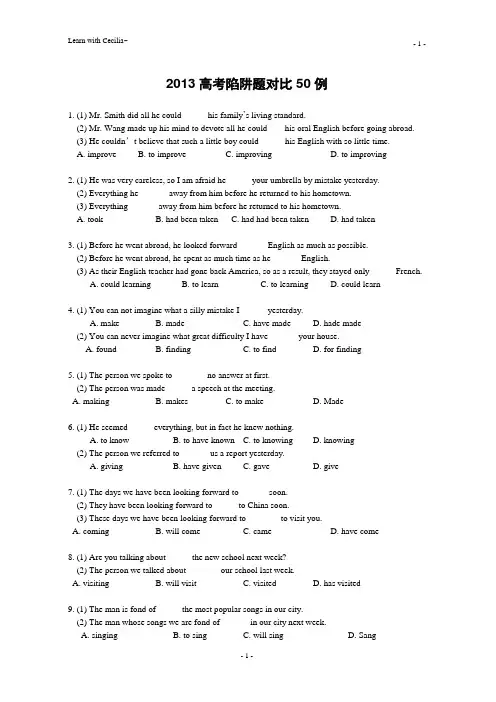
2013高考陷阱题对比50例1. (1) Mr. Smith did all he could _____ his family’s living standard.(2) Mr. Wang made up his mind to devote all he could ___ his oral English before going abroad.(3) He couldn’t believe that such a little boy could _____ his English with so little time.A. improveB. to improveC. improvingD. to improving2. (1) He was very careless, so I am afraid he _____ your umbrella by mistake yesterday.(2) Everything he ______ away from him before he returned to his hometown.(3) Everything ______ away from him before he returned to his hometown.A. tookB. had been takenC. had had been takenD. had taken3. (1) Before he went abroad, he looked forward ______ English as much as possible.(2) Before he went abroad, he spent as much time as he ______ English.(3) As their English teacher had gone back America, so as a result, they stayed only _____ French.A. could learningB. to learnC. to learningD. could learn4. (1) You can not imagine what a silly mistake I ______yesterday.A. makeB. madeC. have madeD. hade made(2) You can never imagine what great difficulty I have ______ your house.A. foundB. findingC. to findD. for finding5. (1) The person we spoke to _______ no answer at first.(2) The person was made _____ a speech at the meeting.A. makingB. makesC. to makeD. Made6. (1) He seemed _____ everything, but in fact he knew nothing.A. to knowB. to have knownC. to knowingD. knowing(2) The person we referred to ______ us a report yesterday.A. givingB. have givenC. gaveD. give7. (1) The days we have been looking forward to ______ soon.(2) They have been looking forward to _____ to China soon.(3) These days we have been looking forward to _______ to visit you.A. comingB. will comeC. cameD. have come8. (1) Are you talking about _____ the new school next week?(2) The person we talked about _______ our school last week.A. visitingB. will visitC. visitedD. has visited9. (1) The man is fond of _____ the most popular songs in our city.(2) The man whose songs we are fond of ______ in our city next week.A. singingB. to singC. will singD. Sang10. (1) Not only_____the jewelry she ____ been sold for her son’s gambling debts but also her house.(2) Never _____ he come unless he _____ his wallet back.A. will, hasB. has, hadC. has, hasD. /, has11. (1) _____ in thought, he almost ran into the car in front of him.(2) _____ his lovely dog, he looked for it everywhere.(3) _____ his dog, he took it in the scary bushes.A. LosingB. Having lostC. LostD. To lose12. (1) The research is so designed that once _____ nothing can be done to change it.A. beginsB. having begunC. beginningD. begun(2) _____ in the queue for almost half an hour, he suddenly realized that he forgot his code.A. Having waitedB. WaitedC. To waitD. Waiting13. (1) --- What do you think made the woman so upset? --- ____ weight.(2) --- What can I do to join in the league? --- _____ weight.A. As she put onB. Put onC. Putting onD. Because of putting on(3) --- Why are the students so diligent these days? --- _______ the entrance exams.A. PassB. To passC. PassingD. Having passed14. (1) Time should be made good use of _____ our lessons well.(2) Time should be spent _____ English by everybody at present.A. learningB. learnedC. to learnD. having learned15. (1) It was only with the help of the local guide ____.(2) It was snowing heavily _____.(3) Only with the help of the local guide _______.A. was the mountain climber rescuedB. then the mountain climber was rescuedC. when the mountain climber was rescuedD. that the mountain climber was rescued16. (1) Never _____ time come again.(2) Never _____ he _____ a single sheep.A. has …lostB. will …loseC. will …lostD. has…lose17. (1) --- ______ was it ____ they discovered the entrance to the underground palace?--- Totally by chance.(2) --- _____ was it _____ they discovered at the entrance to the underground palace? --- A helmet.A. What, thatB. How, thatC. When, howD. Where, that18. (1) I have nothing to confess. _______ you want me to say?(2) I hope you don’t mind, but _____ you were born?A. What is it thatB. What it is whatC. How is it thatD. Where is it that19. (1) Is this factory _______ you visited the other day?(2) Is this the factory _____ you visited the other day?A. the oneB. thatC. whereD. When20. (1) Was it ____ she heard with her ears ______ really made her frightened?(2) Was it _____ she had been _____ really made you all surprised?A. what, thatB. it, thatC. where, thatD. what, /21. (1) _______ what the six blind men said sounded!(2) You can’t imagine _____ he is acting.A. H(h)ow foolishlyB. H(h)ow foolishC. W(w)hat foolishD. W(w)hat foolishly22. (1) It was ______ the old clock the old man spent the whole morning at home.(2) It was three hours that the old man spent _____ the old clock.A. repairB. repairingC. to repairD. in repair23. (1) It was some time later ______ we realize the truth.(2) It was some time ______ we realize the truth.A. untilB. sinceC. beforeD. That24. (1) Please tell me the way you thought of ______ the garden.(2) Have you thought of _____ the garden?A. take care ofB. to take care ofC. taking care ofD. how to take care of25. (1) A fast-food restaurant is the place, ____________, just as the name suggests, eating is performed quickly.(2) A fast-food restaurant is the place, _______ you can eat quickly.(3) A fast-food restaurant is the place, _______ can perform you food quickly.A. whichB. whereC. thereD. What26. (1) The film brought the hours back to me _____ I was taken good care of in that far-away village.(2) The picture brought me back to the hours ___ I spent with the villagers when I was 12.A. untilB. thatC. whenD. Where27. (1) Scientists think that the continents _______ always where they _______ today.(2) Scientists think that the continents today _______ always where they _______.A. aren’t; areB. aren’t; wereC. weren’t; areD. weren’t; were28. (1) -- Where do you think _______ he _______ the computer? -- Sorry, I have no idea.(2) -- Where on earth _______ he _______ the computer? -- Sorry, I have no idea.A. had, boughtB. has, boughtC. did, buyD. /, bought29. (1) We should do more such exercises in the future, I think, _____ those we did yesterday.(2) We should do such exercises in the future, I think, _____ we did yesterday.(3) The teacher suggested that we should do _____ what he did yesterday.A. asB. likeC. aboutD. Than30. (1) He will tell you _______ he expects will win such a match.(2) He will tell you _______ of the teams he expects will win such a match.A. whyB. whomC. whichD. who40. (1) Thank you for the trouble you have _______ to help me.(2) Thank you for the unselfish help you have _____ to me.A. paidB. takenC. givenD. Asked41. (1) Who is it up ______ decide whether to go or not?(2) Who did you go _____ help the people in trouble?A. to …toB. for …forC. to …forD. with …to42. (1) We keep in touch ____ writing often.(2) We keep in touch _____ write to each other to comfort each other.A. withB. toC. onD. By43. (1)-- How long have you been here? --- _______ the end of last month.(2) --- When did you come here? --- _______ the end of last month, I think.(3) --- When shall we finish the project? --- _______ the end of this month, I think.A. InB. ByC. AtD. Since44. (1) You should treat him in the way ______ suits him most.(2) Please share the way with us _____ you study English.A. thatB. in whichC. howD. Why45. (1) He insisted that the sky ____ clear up the following day.(2) Mom insisted that he ____ wash his hands, but he insisted that he ____ washed them.A. wouldB. shouldC. hadD. Be46. (1) He is a strict but kind-hearted father, _______ the children respect but are afraid of.A. /B. thatC. for whomD. one whom(2)My most famous relative of all, _______ who really left his mark on America, was Rob Sussel,my great-grandfather.A. oneB. the oneC. heD. someone(3) He is a good man, _____ you can trust on all your life.A. aB. oneC. that oneD. Which47. (1) Mr. Smith is _______ a good teacher _______ we all respect.(2) Mr. Smith is _______ a good teacher _______ we all respect him.A. such, thatB. such, asC. so, thatD. so, as(3) I want to buy _____ book _____ he bought yesterday.A. the same, thatB. the same, asC. the same, likeD. the same, that(4) He is _____ teacher _____ the headmaster praised at the meeting in public.A. the same, thatB. the same, asC. the same, likeD. the same, that48. (1) ____ nice, the food was all eaten up soon.(2) ____ nice, the food should be made by adding more sugar.A. TastingB. TasteC. TastedD. To taste49. (1) You haven’t been to Beijing, have you?______. And how I wish to go there again.(2) --- You haven’t been to Beijing, have you?--- ______. But how I wish to go there.A. Yes, I have.B. Yes, I haven’tC. No, I haveD. No, I haven’t50. (1) He was sentenced to death _______ what he has stolen from the bank.(2) They were forced to leave their homeland _____ the Nazis got there and killed many people.A. thatB. sinceC. becauseD. because of参考答案1. BDA2. ACB3. CAB4. BB5. DC6. BC7. BAA8. AC9. AC 10. BA11. CBD 12. DA 13. CBB 14. CA 15. DCA16. CA 17. BA 18. AD 19. AB 20. AC21. BA 22. BB 23. CA 24. C/CD 25. BBA26. CB 27. BC 28. DC 29. DAB 30. DC31. CB 32. DA 33. AC 34. CA 35. DB36. BA 37. BA 38. D/AC 39. CA 40. BC41. AD 42. DB 43. DCB 44. A/AB 45. A/BC46. DBB 47. BABA 48. AD 49. AD 50. DC。
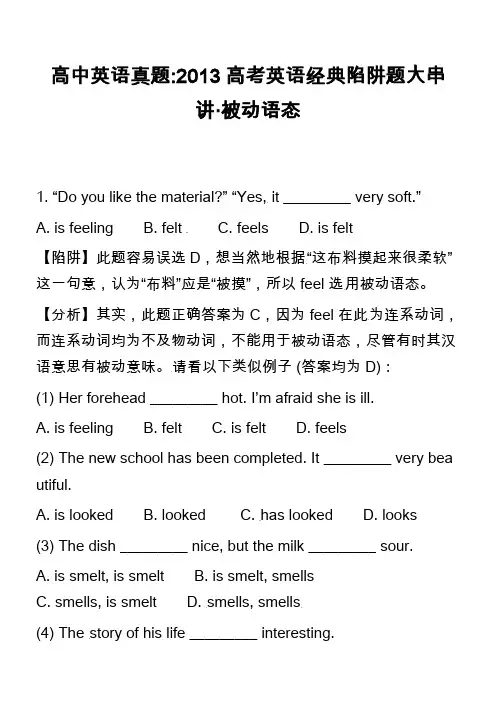
高中英语真题:2013高考英语经典陷阱题大串讲·被动语态1. “Do you like the material?”“Yes, it _________ very soft.”A. is feelingB. feltC. feelsD. is felt【陷阱】此题容易误选D,想当然地根据“这布料摸起来很柔软”这一句意,认为“布料”应是“被摸”,所以 feel 选用被动语态。
【分析】其实,此题正确答案为C,因为 feel 在此为连系动词,而连系动词均为不及物动词,不能用于被动语态,尽管有时其汉语意思有被动意味。
请看以下类似例子 (答案均为D):(1) Her forehead _________ hot. I’m afraid she is ill.A. is feelingB. feltC. is feltD. feels(2) The new school has been completed. It _________ very bea utiful.A. is lookedB. lookedC. has lookedD. looks(3) The dish _________ nice, but the milk _________ sour.A. is smelt, is smeltB. is smelt, smellsC. smells, is smeltD. smells, smells(4) The story of his life _________ interesting.A. is soundedB. is soundingC. has soundedD. sounds2. He was angry _________ your work. He said that he _________ at all.A. at, didn’t satisfyB. to, didn’t satisfyC. at, wasn’t satisfiedD. to, wasn’t satisfied【陷阱】几个干扰项均有可能被误选。

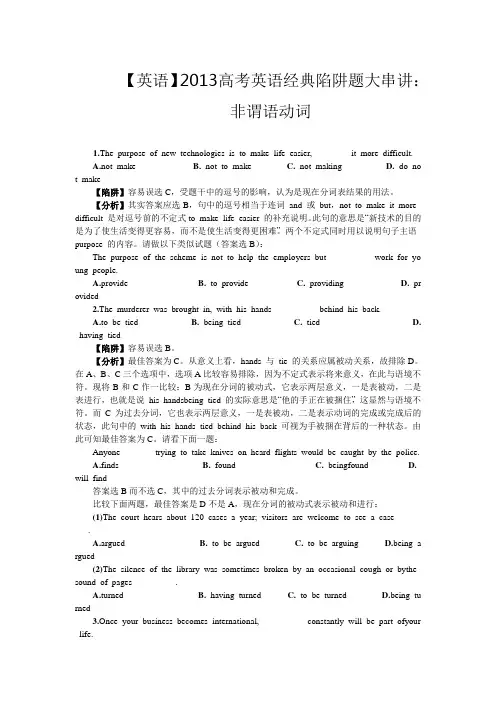
【英语】2013高考英语经典陷阱题大串讲:非谓语动词1.The purpose of new technologies is to make life easier, _______ it more difficult.A.not makeB.not to makeC.not makingD.do no t make【陷阱】容易误选C,受题干中的逗号的影响,认为是现在分词表结果的用法。
【分析】其实答案应选B,句中的逗号相当于连词and 或but,not to make it more difficult 是对逗号前的不定式to make life easier 的补充说明。
此句的意思是“新技术的目的是为了使生活变得更容易,而不是使生活变得更困难”。
两个不定式同时用以说明句子主语purpose 的内容。
请做以下类似试题(答案选B):The purpose of the scheme is not to help the employers but _________ work for yo ung people.A.provideB.to provideC.providingD.pr ovided2.The murderer was brought in, with his hands _________ behind his back.A.to be tiedB.being tiedC.tiedD. having tied【陷阱】容易误选B。
【分析】最佳答案为C。
从意义上看,hands 与tie 的关系应属被动关系,故排除D。
在A、B、C三个选项中,选项A比较容易排除,因为不定式表示将来意义,在此与语境不符。
现将B和C作一比较:B为现在分词的被动式,它表示两层意义,一是表被动,二是表进行,也就是说his handsbeing tied 的实际意思是“他的手正在被捆住”,这显然与语境不符。
而C为过去分词,它也表示两层意义,一是表被动,二是表示动词的完成或完成后的状态,此句中的with his hands tied behind his back 可视为手被捆在背后的一种状态。
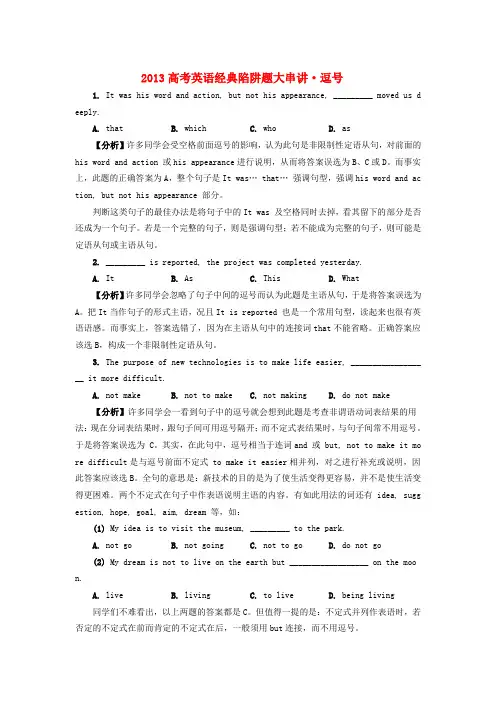
2013高考英语经典陷阱题大串讲·逗号1. It was his word and action, but not his appearance, _________ moved us d eeply.A. thatB. whichC. whoD. as【分析】许多同学会受空格前面逗号的影响,认为此句是非限制性定语从句,对前面的his word and action 或his appearance进行说明,从而将答案误选为B、C或D。
而事实上,此题的正确答案为A,整个句子是It was… that… 强调句型,强调his word and ac tion, but not his appearance 部分。
判断这类句子的最佳办法是将句子中的It was 及空格同时去掉,看其留下的部分是否还成为一个句子。
若是一个完整的句子,则是强调句型;若不能成为完整的句子,则可能是定语从句或主语从句。
2. _________ is reported, the project was completed yesterday.A. ItB. AsC. ThisD. What【分析】许多同学会忽略了句子中间的逗号而认为此题是主语从句,于是将答案误选为A。
把It当作句子的形式主语,况且It is reported 也是一个常用句型,读起来也很有英语语感。
而事实上,答案选错了,因为在主语从句中的连接词that不能省略。
正确答案应该选B,构成一个非限制性定语从句。
3. The purpose of new technologies is to make life easier, ________________ __ it more difficult.A. not makeB. not to makeC. not makingD. do not make【分析】许多同学会一看到句子中的逗号就会想到此题是考查非谓语动词表结果的用法:现在分词表结果时,跟句子间可用逗号隔开;而不定式表结果时,与句子间常不用逗号。

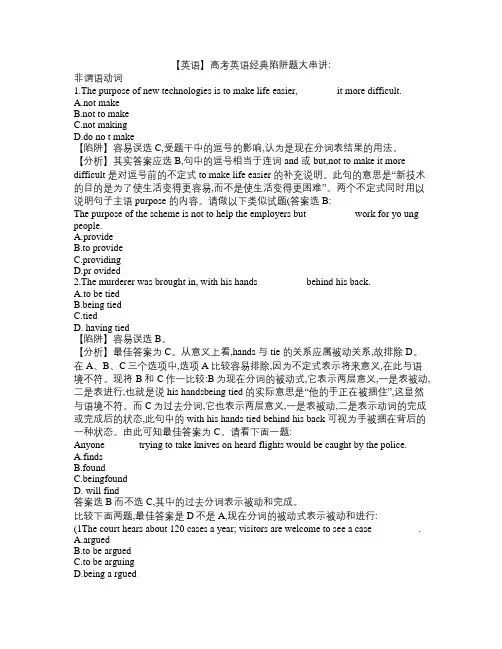
【英语】高考英语经典陷阱题大串讲:非谓语动词1.The purpose of new technologies is to make life easier, _______ it more difficult.A.not makeB.not to makeC.not makingD.do no t make【陷阱】容易误选C,受题干中的逗号的影响,认为是现在分词表结果的用法。
【分析】其实答案应选B,句中的逗号相当于连词and 或but,not to make it more difficult 是对逗号前的不定式to make life easier 的补充说明。
此句的意思是“新技术的目的是为了使生活变得更容易,而不是使生活变得更困难”。
两个不定式同时用以说明句子主语purpose 的内容。
请做以下类似试题(答案选B:The purpose of the scheme is not to help the employers but _________ work for yo ung people.A.provideB.to provideC.providingD.pr ovided2.The murderer was brought in, with his hands _________ behind his back.A.to be tiedB.being tiedC.tiedD. having tied【陷阱】容易误选B。
【分析】最佳答案为C。
从意义上看,hands 与tie 的关系应属被动关系,故排除D。
在A、B、C三个选项中,选项A比较容易排除,因为不定式表示将来意义,在此与语境不符。
现将B和C作一比较:B为现在分词的被动式,它表示两层意义,一是表被动,二是表进行,也就是说his handsbeing tied 的实际意思是“他的手正在被捆住”,这显然与语境不符。
而C为过去分词,它也表示两层意义,一是表被动,二是表示动词的完成或完成后的状态,此句中的with his hands tied behind his back 可视为手被捆在背后的一种状态。
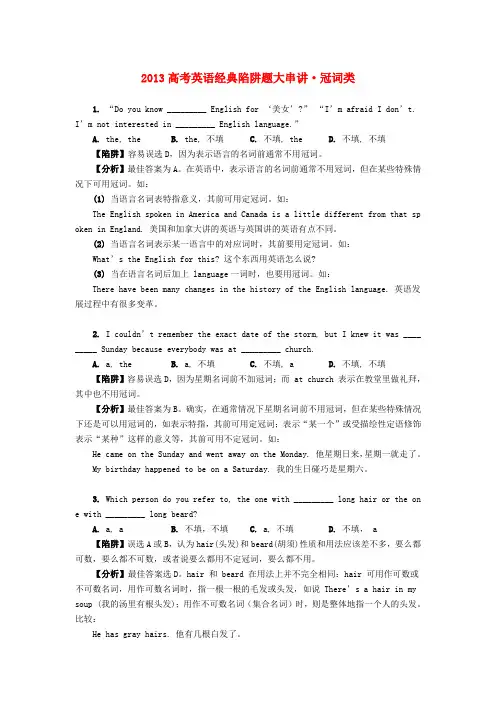
2013高考英语经典陷阱题大串讲·冠词类1.“Do you know _________ English for ‘美女’?” “I’m afraid I don’t. I’m not interested in _________ English language.”A. the, theB. the, 不填C.不填, theD.不填, 不填【陷阱】容易误选D,因为表示语言的名词前通常不用冠词。
【分析】最佳答案为A。
在英语中,表示语言的名词前通常不用冠词,但在某些特殊情况下可用冠词。
如:(1)当语言名词表特指意义,其前可用定冠词。
如:The English spoken in America and Canada is a little different from that sp oken in England. 美国和加拿大讲的英语与英国讲的英语有点不同。
(2)当语言名词表示某一语言中的对应词时,其前要用定冠词。
如:What’s the English for this? 这个东西用英语怎么说?(3)当在语言名词后加上 language一词时,也要用冠词。
如:There have been many changes in the history of the English language. 英语发展过程中有很多变革。
2.I couldn’t remember the exact date of the storm, but I knew it was ____ _____ Sunday because everybody was at _________ church.A. a, theB. a, 不填C.不填, aD.不填, 不填【陷阱】容易误选D,因为星期名词前不加冠词;而 at church 表示在教堂里做礼拜,其中也不用冠词。
【分析】最佳答案为B。
确实,在通常情况下星期名词前不用冠词,但在某些特殊情况下还是可以用冠词的,如表示特指,其前可用定冠词;表示“某一个”或受描绘性定语修饰表示“某种”这样的意义等,其前可用不定冠词。
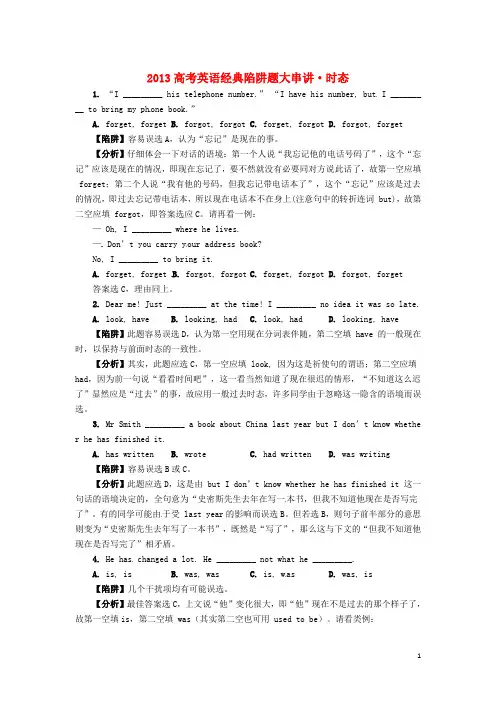
2013高考英语经典陷阱题大串讲·时态1.“I _________ his telephone number.” “I have his number, but I _______ __ to bring my ph one book.”A. forget, forgetB. forgot, forgotC. forget, forgotD. forgot, forget【陷阱】容易误选A,认为“忘记”是现在的事。
【分析】仔细体会一下对话的语境:第一个人说“我忘记他的电话号码了”,这个“忘记”应该是现在的情况,即现在忘记了,要不然就没有必要同对方说此话了,故第一空应填 forget;第二个人说“我有他的号码,但我忘记带电话本了”,这个“忘记”应该是过去的情况,即过去忘记带电话本,所以现在电话本不在身上(注意句中的转折连词 but),故第二空应填 forgot,即答案选应C。
请再看一例:— Oh, I _________ where he lives.—Don’t you carry y our address book?No, I _________ to bring it.A. forget, forgetB. forgot, forgotC. forget, forgotD. forgot, forget答案选C,理由同上。
2. Dear me! Just _________ at the time! I _________ no idea it was so late.A. look, haveB. looking, hadC. look, hadD. looking, have【陷阱】此题容易误选D,认为第一空用现在分词表伴随,第二空填 have 的一般现在时,以保持与前面时态的一致性。
【分析】其实,此题应选C,第一空应填 look, 因为这是祈使句的谓语;第二空应填had,因为前一句说“看看时间吧”,这一看当然知道了现在很迟的情形,“不知道这么迟了”显然应是“过去”的事,故应用一般过去时态,许多同学由于忽略这一隐含的语境而误选。
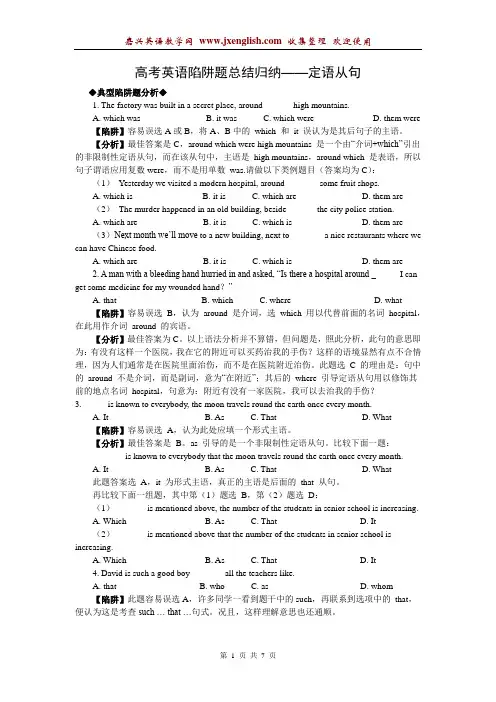
高考英语陷阱题总结归纳——定语从句◆典型陷阱题分析◆1. The factory was built in a secret place, around ______ high mountains.A. which wasB. it wasC. which wereD. them were【陷阱】容易误选A或B,将A、B中的which 和it 误认为是其后句子的主语。
【分析】最佳答案是C,around which were high mountains 是一个由“介词+which”引出的非限制性定语从句,而在该从句中,主语是high mountains,around which 是表语,所以句子谓语应用复数were,而不是用单数was.请做以下类例题目(答案均为C):(1)Y esterday we visited a modern hospital, around _______ some fruit shops.A. which isB. it isC. which areD. them are(2)The murder happened in an old building, beside ______ the city police station.A. which areB. it isC. which isD. them are(3)Next month we’ll move to a new building, next to _______ a nice restaurants where we can have Chinese food.A. which areB. it isC. which isD. them are2. A man with a bleeding hand hurried in and asked, “Is there a hospital around ______ I can get some medicine for my wounded hand?”A. thatB. whichC. whereD. what【陷阱】容易误选B,认为around 是介词,选which 用以代替前面的名词hospital,在此用作介词around 的宾语。
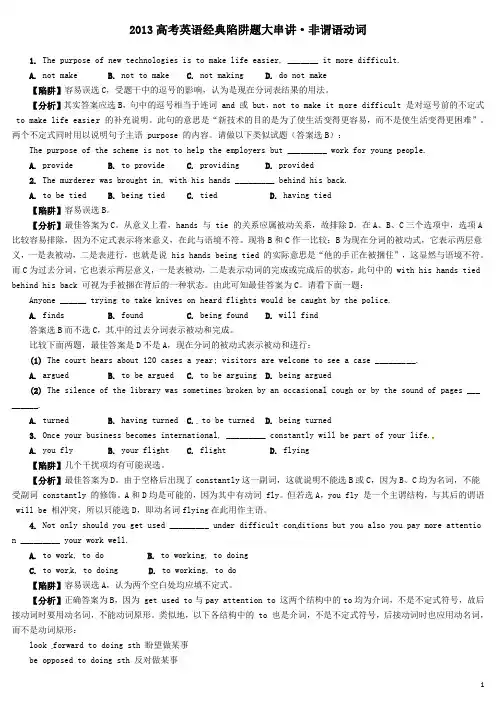
2013高考英语经典陷阱题大串讲·非谓语动词1. The purpose of new technologies is to make life easier, _______ it more difficult.A. not makeB. not to makeC. not makingD. do not make【陷阱】容易误选C,受题干中的逗号的影响,认为是现在分词表结果的用法。
【分析】其实答案应选B,句中的逗号相当于连词 and 或 but,not to make it m ore difficult 是对逗号前的不定式 to make life easie r 的补充说明。
此句的意思是“新技术的目的是为了使生活变得更容易,而不是使生活变得更困难”。
两个不定式同时用以说明句子主语 purpose 的内容。
请做以下类似试题(答案选B):The purpose of the scheme is not to help the employers but _________ work for young people.A. provideB. to provideC. providingD. provided2. The murderer was brought in, with his hands _________ behind his back.A. to be tiedB. being tiedC. tiedD. having tied【陷阱】容易误选B。
【分析】最佳答案为C。
从意义上看,hands 与 tie 的关系应属被动关系,故排除D。
在A、B、C三个选项中,选项A 比较容易排除,因为不定式表示将来意义,在此与语境不符。
现将B和C作一比较:B为现在分词的被动式,它表示两层意义,一是表被动,二是表进行,也就是说 his hands being tied 的实际意思是“他的手正在被捆住”,这显然与语境不符。
高中英语真题:2013高考英语经典陷阱题大串讲·情态动词1. “Mike is often absent from class.”“Tell him he _________ ans wer for it if he goes on behaving like that.”A. shallB. willC. wouldD. can【陷阱】几个干扰项均有可能误选。
【分析】最佳答案选A。
shall 用作情态动词主要有以下两个用法:(1) 用于疑问句中征求意见。
如:Shall I help you? 要不要我帮帮你?Shall I open the window? 要我把窗子打开吗?(2) 用于陈述句中表示允诺、告诫、警告、威胁、命令、规定、必然性等(可用于各类人称)。
如:You shall suffer for this. 你会为此事吃苦头的。
(表威胁)Each competitor shall wear a number. 每个参赛者要戴一个号码。
(表规定)You shall hear everything as soon as you come. 你一来就可听到所有情况了。
(表允诺)请做以下试题(答案均选 shall):(1) “I promise that she _________ get a nice present on her birth day.”“Will it be a great surprise to her?”A. shouldB. mustC. wouldD. shall2. You ________ pay too much attention to your reading skill, as it is so imp ortant.A. cannotB. shouldn’tC. mustn’tD. needn’t【陷阱】几个干扰项均有可能误选。
【分析】最佳答案选A。
高考英语典型“陷阱题〞50例〔含答案解析〕同学们在平时做题的过程中有没有发现这样的现象:有些题目看起来似曾相识,轻而易举就可选出"正确答案",结果往往发现自己错了。
这些题目就是我们所说的"陷阱题"。
它们看似简单,实如此不易解答。
出题者往往设下"陷阱",如果大家用固定的思维方式去考虑,就会误选答案。
近年来,高考试卷中也常有这种性质的试题出现。
当同学们遇到这种题时,既不可"轻易下手",也不可不知所措,而应做到先三思而后行。
首先,同学们要认真审题,发现"陷阱"。
要灵活地运用语法规如此,理顺思路,寻找"陷阱"。
其次,要运用多向思维,分析"陷阱"。
不要用习惯的、单一的、片面的思维去解题。
再次,要去伪存真,识别"陷阱"。
要抓住根本知识点与特殊现象,不厌其烦地归纳理解,认清选择题目中的"鱼目"与"珍珠",防止落入"陷阱"。
最后就是要加强验证,跳出"陷阱"。
这就要求学习者要有良好的检查验证习惯,掌握验证的方法,即使落入了"陷阱",也能在验证过程中,发现"陷阱",并迅速地跳出来。
下面是-些比拟典型的"陷阱题".请大家做做看:1. Mr Wang made up his mind to devote all he could ______ his oral English before going abroad.A. improveB. to improveC. improvingD. to improving2. Everything he ______ away from him before he returned to his hometown.A. tookB. had been takenC. had had been takenD. had taken3. Before he went abroad,he spent as much time as he _____ English.A. could learningB. learnedC. to learnD. could learn4. You can never imagine what great difficuly I have ______ your house.A. foundB. findingC. to findD. for finding5. The person we spoke to ______ no answer at first.A. makingB. makesC. makeD. made6. The person we referred to ______ us a report tomorrow.A. givingB. will giveC. gaveD. give7. The days we have been looking forward to _______ soon.A. comingB. will comeC. cameD. have come8. The person we talked about ______ our school last week.A. visitingB. will visitC. visitedD. has visited9. The man whose songs we are fond of ______ in our city next week.A. singingB. to singC. will singD. sang10. Not only ______ the jewelry she _____ been sold for her son's gambling debts but also her house.A. is;hasB. has;hadC. has;hasD. 不填;has11. ______ in thought,he almost ran into the car in front of him.A. LosingB. Having lostC. LostD. To lose12. The research is so designed that once nothing can be' done to change it.A. beginsB. having begunC. beginningD. begun13. - What do you think made the woman so upset?- _______ weight.A. As she put onB. Put onC. Putting onD. Because of putting on14. Time should be made good use of ______ our lessons well.A. learningB. learnedC. to learnD. having learned15. It was only with the help of the local guide ______.A. was the mountain climber rescuedB. then the mountain climber was rescuedC. when the mountain climber was rescuedD. that the mountain climber was rescued16. Never ______ time come again.A. has lostB. will loseC. will lostD. lose17. - ______ was it ______ they discovered the entrance to the underground palace?- Totally by chance.A. What;thatB. How;thatC. When;howD. Where;that18. I have nothing to confess. ______ you want me to say?A. What is it thatB. What it is whatC. How is it thatD. How it is that19. Is this factory ______ you visited the other day?A. the oneB. thatC. whereD.when20. Was it _____ she heard with her ears really made her frightened?A:what;that B. it;that C. that;which D. what;不填21. ______ what the six blind men said sounded!A. How foolishlyB. How foolishC. What foolishlyD. What foolish22. It was ______ the old clock that the old man spent the whole morning at home.A. repairB. repairingC. to repairD. in repair23. Is this hotel ______ you said we were to stay in your letter?.A. thatB. whereC. the oneD. in which24. Please tell me the way you thought of ______ the garden.A. take care ofB. to take care ofC. takinq care ofD. how to take care of25. A fast-food restaurant is the place _______,just as the name suggests,eating is performed quickly.A. whichB. whereC. thereD. what26. The film brought the hours back to me ______ I was taken good care of in that far-away village.A. untilB. thatC. whenD. where27. The professor has written another book,________ of great importance to cornputer science.A. which I think it isB. and I think isC. which I think isD. when I think is28. - Where do you think ______ he ______ the computer?- Sorry,I have no idea.A. had;boughtB. has;boughtC. did;buyD. 不填;bought29. We should do more such exercises in the future,I think,_____ those we did yesterday.A. asB. likeC. aboutD. than30. He will tell you _____ he expects will win such a match.A. whyB. whomC. whichD. who31. In New Zealand,I made lots of friends _____ a very practical knowledge of the English language.A. getB. togetC. gettingD. got32. I'm busy now. I'm sorry I can't help _____ the flowers.A. watedngB. wateredC. watersD. to water33. Who would you rather ______ the report instead of you?A. have writeB. have to writeC. writeD. have written34. We must stop pollution ______ longer.A. livingB. from livingC. to liveD. live35. - Was it under the tree ______ you were away talking to a friend?- Sure. But when I get back there,the bike was gone.A. thatB.whereC. whichD. while36. Not far from the club there was a garden,______ owner seated in it playing bridge with his children every aftemoon.A. whoseB. itsC. whichD. that37. Wang Ling was elected ______ all he is the tallest.A. becauseB. because ofC. forD. as38. We'll be free tomorrow,so I suggest ______ to the history museum.A. to visitB. visitingC. we should visitD. a visit39. I like swimming,while what my brother enjoys ______.A. cookingB. to cookC. is cookingD. cook40. Thank you for the trouble you have ______ to help me.A. paidB. takenC. hadD. asked41. Who is it up _______ decide whether to goor not?A. to toB. for forC. to forD. for to42. We keep in touch ______ writing often.A. withB. ofC. onD. by43. - How long have you been here?- ______ the end of last month,A. InB. ByC.AtD. Since44. You should treat him (in) the way ______ suits him most.A. thatB. in whichC. 不填D. why45. He insisted that the sky ______ clear up the following day.A. wouldB. shouldC. 不填D. be46. He is a strict but kind-hearted father,______ the children respect but are afraid of.A.不填B. thatC. for whomD. one whom47. Mr Smith is ______ a good teacher ______ we all respect.A. such;thatB. such;asC. so;thatD. so;as48. ______ nice,the food was all eaten up soon.A. TastingB. TasteC. TastedD. To taste49. - You haven't been to Beijing,have you?-______. And how I wish to go there again!A. Yes,t haveB. Yes,I haven'tC. No,I haveD. No,I haven't50. He was sentenced to death ______ what he has stolen from the bank.A. thatB. sinceC. becauseD. because of答案与辨析:1.此题中包含固定短语devote…to,其中to为介词,后面应接动名词。
几道典型逗号陷阱题分析1. There were a lot of people in the reading-room, most of _________ with t heir heads bent down over their books.A. themB. whomC. thatD. which【分析】许多同学会根据句子中的逗号,想当然地认为这是考查非限制性定语从句,从而将答案误选为 B。
但事实上,逗号后面由于没有谓语动词,根本不是完整的句子,而是一个“代词 + 动词的过去分词”的独立主格结构,因此,正确答案应该选 A。
2. The purpose of new technologies is to make life easier, ______________ ____ it more difficult.A. not makeB. not to makeC. not makingD. do not make【分析】许多同学会一看到句子中的逗号就会想到此题是考查非谓语动词表结果的用法:现在分词表结果时,跟句子间可用逗号隔开;而不定式表结果时,与句子间常不用逗号。
于是将答案误选为 C。
其实,在此句中,逗号相当于连词and 或 but, not to make it mo re difficult是与逗号前面不定式 to make it easier相并列,对之进行补充或说明,因此答案应该选B。
全句的意思是:新技术的目的是为了使生活变得更容易,并不是使生活变得更困难。
两个不定式在句子中作表语说明主语的内容。
有如此用法的词还有 idea, sugg estion, hope, goal, aim, dream 等,如:(1) My idea is to visit the museum, _________ to the park.A. not goB. not goingC. not to goD. do not go(2) My dream is not to live on the earth but __________________ on the moo n.A. liveB. livingC. to liveD. being living同学们不难看出,以上两题的答案都是C。
2013⾼考英语主语从句典型易错陷阱题 _________ with the right knowledge can give first aid.A. WhoB. WhoeverC. AnyoneD. Who ever 【分析】此题容易误选B,主要受以下这类句⼦的影响⽽形成思维定势: Whoever says that is lying. 谁那样说,谁就是在说谎。
Whoever breaks this law deserves a fine. 违反本法者应予以罚款。
Whoever comes first can get a ticket free. 谁先来谁就可以免费得到⼀张票。
以上各例中的 whoever 引导的均为主语从句,它们均可换成 anyone who,但不能换成 anyone。
上⾯的试题从表⾯上看,与以上各例很相似,其实有本质的不同,即 _________ with the right knowledge 中没有谓语动词,所以我们不能选whoever。
此题的正确答案为C,anyone 为句⼦主语,with the right knowledge 为修饰 anyone 的定语。
请做以下试题: (1) _________ with a good education can apply for the job.A. WhoB. WhoeverC. AnyoneD. Who ever (2) _________ has a good education can apply for the job.A. WhoB. WhoeverC. AnyoneD. Who ever (3) _________ having a good education can apply for the job.A. WhoB. WhoeverC. AnyoneD. Who ever (4) _________ seen smoking here will be fined.A. WhoB. WhoeverC. AnyoneD. Who ever (5) _________ is seen smoking here will be fined.A. WhoB. WhoeverC. AnyoneD. Who ever (6) _________ smoking here will be fined.A. WhoB. WhoeverC. AnyoneD. Who ever (7) _________ smokes here will be fined.A. WhoB. WhoeverC. AnyoneD. Who ever 第(1)题选C,介词短语with a good education 为修饰 anyone 的定语; 第(2)题选B,whoever has a good education 为主语从句; 第(3)题选C,现在分词短语having a good education 为修饰 anyone 的定语; 第(4)题选C,过去分词短语seen smoking here 为修饰 anyone 的定语(可视为 anyone who is seen smoking here 之省略); 第(5)题选B,whoever is seen smoking here 为主语从句; 第(6)题选C,现在分词短语smoking here 为修饰anyone 的定语; 第(7)题B,whoever smokes here 为主语从句。
2013高考英语经典陷阱题大串讲·介词类1.“You went late _________ the stadium yesterda y evening, didn’t you?” “Yes, my wife was a little late _________ the supper.”A. to, withB. for, withC. for, forD. at, for【陷阱】容易误选 B 或D。
【分析】答案应选 A。
第一空填to 比较好理解,因为此处的late为副词,用以修饰go to the stadium 中的动词go;而第二句的 with 则是许多同学不容易想到的,相反,更多地可能是想到 for,现将两者区别如下:be late for表示做某事迟到,而be late w ith 表示做某事做晚了(=be late in doing sth)。
比较:We were late for dinner. 我们吃饭迟到了。
We were late with dinner [=in having dinner]. 我们吃饭吃得迟。
句中 my wife was a little late with the supper 的意思是“我妻子准备晚饭稍迟了一点”。
2. Sometimes our opinions differ _________ what we choose to observe and ho w we deal with what we’ve observedA. whichB. sinceC. becauseD. because of【陷阱】容易误选C。
因为按英语语法习惯,because是连词,其后接句子;而becaus e of是复合介词,其后接名词、代词或动名词等。
【分析】此题答案选D。
because 作为从属连词,主要用于引导原因状语从句,既然是引导一个从句,也就是说它的后面不能再连用“引导词”。
漫滴州演漏市慢寨学校2013高考英语经典陷阱题大串讲·it用法1. Everyone knows that _________ is dangerous to play with fire, but _________ is diffic ult is to prevent children from playing with fire.A. it, itB. what, whatC. it, whatD. what, it【陷阱】很容易误选B,认为两空均考查形式主语。
【分析】最佳答案是D,第一空填形式主语,真正的主语是其后的不定式 to play with fire。
第二空填 what,what is difficult 是主语从句,注意 what is difficult 后的谓语动词 is。
请做以下类似试题:(1) I know _________ is important to know my own limitations, but _________ is difficult is to help others to know their own limitations.A. it, itB. what, whatC. it, whatD. what, it(2) Yes, _________ is difficult to find a job nowadays, but _________ is more difficult is try to find such a job with a high salary but little things to do.A. it, itB. what, whatC. it, whatD. what, it2. I dislike ______ when others laugh at me in public or think poorly of me behind.A. thatB. thoseC. itD. them【陷阱】几个干扰项均有可能误选。
2013高考英语经典陷阱题大串讲·逗号1. It was his word and action, but not his appearance, _________ moved us d eeply.A. thatB. whichC. whoD. as【分析】许多同学会受空格前面逗号的影响,认为此句是非限制性定语从句,对前面的his word and action 或his appearance进行说明,从而将答案误选为B、C或D。
而事实上,此题的正确答案为A,整个句子是It was… that… 强调句型,强调his word and ac tion, but not his appearance 部分。
判断这类句子的最佳办法是将句子中的It was 及空格同时去掉,看其留下的部分是否还成为一个句子。
若是一个完整的句子,则是强调句型;若不能成为完整的句子,则可能是定语从句或主语从句。
2. _________ is reported, the project was completed yesterday.A. ItB. AsC. ThisD. What【分析】许多同学会忽略了句子中间的逗号而认为此题是主语从句,于是将答案误选为A。
把It当作句子的形式主语,况且It is reported 也是一个常用句型,读起来也很有英语语感。
而事实上,答案选错了,因为在主语从句中的连接词that不能省略。
正确答案应该选B,构成一个非限制性定语从句。
3. The purpose of new technologies is to make life easier, ________________ __ it more difficult.A. not makeB. not to makeC. not makingD. do not make【分析】许多同学会一看到句子中的逗号就会想到此题是考查非谓语动词表结果的用法:现在分词表结果时,跟句子间可用逗号隔开;而不定式表结果时,与句子间常不用逗号。
于是将答案误选为 C。
其实,在此句中,逗号相当于连词and 或 but, not to make it mo re difficult是与逗号前面不定式 to make it easier相并列,对之进行补充或说明,因此答案应该选B。
全句的意思是:新技术的目的是为了使生活变得更容易,并不是使生活变得更困难。
两个不定式在句子中作表语说明主语的内容。
有如此用法的词还有 idea, sugg estion, hope, goal, aim, dream 等,如:(1) My idea is to visit the museum, _________ to the park.A. not goB. not goingC. not to goD. do not go(2) My dream is not to live on the earth but __________________ on the moo n.A. liveB. livingC. to liveD. being living同学们不难看出,以上两题的答案都是C。
但值得一提的是:不定式并列作表语时,若否定的不定式在前而肯定的不定式在后,一般须用but连接,而不用逗号。
4. If a book is in English, _________ means slow progress for you.A. asB. whichC. whatD. that【分析】许多同学会忽略句首的if,根据空格前面的逗号判断填空句为一个非限制性定语从句,于是将答案误选为B或A;其实,此题得正确答案应该选D。
逗号前是一个条件句,逗号后面应该要有该状语从句的主句,that在此代表前面的内容,作句子的主语。
现在请看下列几道题:(1) If he is only interested in your books, _________ just shows how shall ow he is.A. asB. whichC. whatD. that(2) If you want to go, _________ is quite all right with me.A. thatB. whichC. and itD. so(3) When I say two hours, __________________ includes time for eating.A. asB. whichC. whatD. that(4) If you want a double room, _________ will cost another $ 15.A. asB. whichC. whatD. that(5) If you have the money, _________ will be OK.A. thatB. whichC. and itD. so(6)Unless I’m very much mistak en, _________ is my watch you are wearing.A. asB. whichC. whatD. that它们的答案也应该选 that,而不应该选 which。
5. There were a lot of people in the reading-room, most of _________ with t heir heads bent down over their books.A. themB. whomC. thatD. which【分析】许多同学会根据句子中的逗号,想当然地认为这是考查非限制性定语从句,从而将答案误选为 B。
但事实上,逗号后面由于没有谓语动词,根本不是完整的句子,而是一个“代词 + 动词的过去分词”的独立主格结构,因此,正确答案应该选 A。
6. Not far from the school there was a garden, ___________ owner seated in it playing chess with his grandson every afternoon.A. itsB. whoseC. whichD. that【分析】此题与上一题相似,许多同学会根据句子中的逗号,想当然地认为这是考查非限制性定语从句,whose 在定语从句中用作定语修饰其后面的名词owner,从而将答案误选为 B。
从表面上看,似乎天衣无缝,但事实上,逗号后面由于没有谓语动词,根本不是完整的句子。
尽管句子中优两个动词(seated和playing),然而它们并不是谓语动词,而都是非谓语动词,在句子中作定语,修饰说明名词owner。
因此,逗号后面是一个“代词 + 动词的过去分词”的独立主格结构,正确答案应该选 A。
现在请看下面两个类似的句子:(1) He wrote a lot of novels, many of __________________ translated into fo reign languages.A. itB. themC. whichD. that(2) He wrote a lot of novels, many of __________________ were translated i nto foreign languages.A. itB. themC. whichD. that(3) He wrote a lot of novels, and many of __________________ were translated into foreign languages.A. itB. themC. whichD. that第(1)题的答案应该选 B,而不能选 C。
因为,句子中translated是非谓语动词,不能充当句子的谓语,从而可确定逗号后面部分不是句子,故答案不能选C;第(2)题答案应该C,因为逗号后面部分由于有were translated作谓语,从而使后面部分构成定语从句来说明novels的情况;第(3)题的答案应该选 B,因为逗号后面虽然有 were translate d,但是还有连词 and,从而使前后两个句子成为并列句,而不是主从复合句,故答案应该选C。
从上面可以看出:在给句子选择答案时,不仅要注意标符号,同时,也还要注意句子的结构。
7. It is his dog, according to Li Lei, _________ saved him from the trap.A. whoB. whichC. thatD. what【分析】许多同学会认为这是考查定语从句,先行词是 his dog 或 Li Lei,于是将答案误选为A、B,其实,这是一个强调句型,是对主语his dog 进行强调,因此,正确答案应该选 C。
8. The children are having a good time, _________ with sand, others with to ys.A. some of them playingB. who playingC. some of whom are playingD. some of them【分析】许多同学会受第1个逗号的影响,以为是非限制性定语从句,将答案误选为C。
其实空格部分应与others with toys 并行,同为独立主格结构。
句意为:孩子们玩得很痛快,有的玩沙子,有的玩玩具。
故答案选 A。